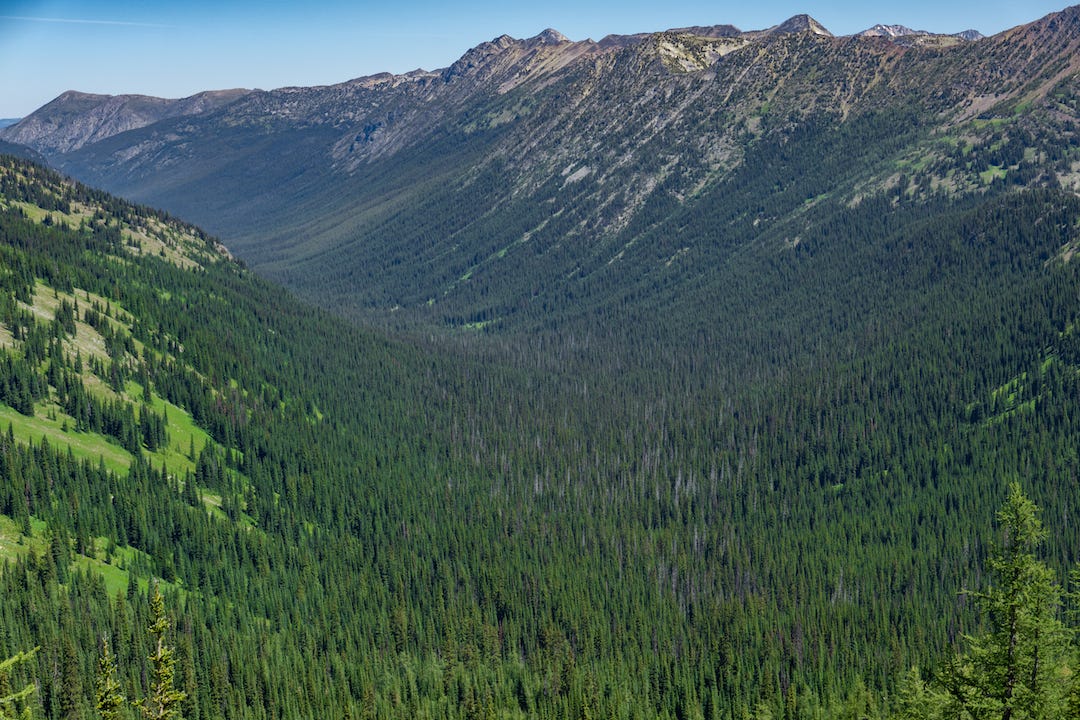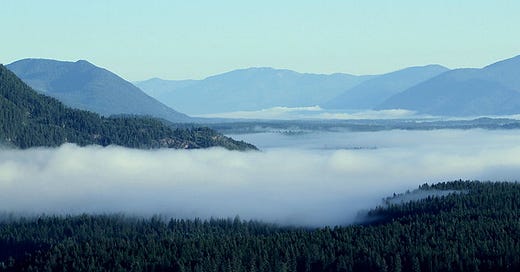Climate action means major mining reform, says Biden admin
Eyeing climate tech, a Biden commission called on congress to enact "comprehensive" change to a 150-year-old law
Climate technologies require enormous amounts of metal. I’m Ian Morse, and this is Green Rocks, a newsletter that doesn’t want dirty mining to ruin clean energy.
Want to start a mine? In the US, it’s easier than you might think. Just go to any public lands in the West, mark your territory with four stakes, and notify the federal government that there are valuable minerals there. For a mine the size of Manhattan, you need only pay as little as $36,000. Many mines are smaller and can be bought for a few hundred dollars, even as their predicted mineral wealth can be upward of $1 billion.
At that point, the government cannot choose any other use for that land — not for conservation, nor for sale to agriculture or solar farms. No matter if it’s on sacred Native lands, or if the area is used for recreation.
And the best part: It’s free to use. You don’t have to pay a dime to the government in royalties. When you’re done digging, just leave. If your abandoned mine leaches toxic elements, it’s not your responsibility, but rather the government’s. No wonder the Western US routinely tops global rankings of “most attractive places to mine.”
If you want to become a coal miner, these rules don’t apply. Along with oil and gas extractors, you must pay significant costs and royalties to the federal government.
“That’s what sets apart our hardrock minerals, the ones we purportedly need to build a renewable energy infrastructure. People cannot say no to a mine where it does not belong, according to the government’s legal interpretation,” says Aaron Mintzes, senior policy counsel with Earthworks.

The law that upholds this system turns 150 years old next year. However, President Biden may oversee its most significant reform, which could bring US rules closer to global standards.
Released last week, his administration’s 250-page report on critical mineral supply chains calls on Congress and cabinet officials to support a legal rewrite. From the report, with my emphasis:
To reduce conflict, provide increased certainty for industry, improve the environmental performance of mines, better engage Tribes and local communities, and protect taxpayers from the cost of remediating abandoned mines, Congress should enact comprehensive reform of the GML of 1872 and USDA and DOI should strengthen the regulations governing mining on public lands.
GML refers to the General Mining Law, and the story of its birth is important, because it still exists in its basic form today.
150 years ago, the US stopped making treaties with Tribes. The next year, President Ulysses S Grant, who waged wars against Native groups, signed the act into law to encourage wealth extraction in the West. California’s gold rush had dwindled, but white settlers chasing minerals had spread across the country. Valuable metals lay beneath their feet, and the government seized the land, forests, and water on top.
Coal, oil and gas projects were given more specific rules in 1920, but other hardrock minerals kept the same law. So, rather surprisingly, regulation on mining lithium, cobalt and copper — purported to ‘advance human progress’ according to some marketing — grants fewer rights to local communities than fossil fuels.
Mintzes told me in October that the Trump and Biden campaign platforms were “like night and day.” Today, Earthworks publishes a report he co-authored that urges the Biden administration to follow through on those policies. For an organization that frequently challenges the federal government, the report overlaps significantly with Biden’s own, albeit with more detail.
One of those details is the principle for Free, Prior, and Informed Consent, or FPIC, which the United Nations since 2007 has urged countries to support. In contrast, the 1872 mining law protects the right to mine, with or without consent.
“What we want is for that legislation to seek to achieve free, prior and informed consent of indigenous and non-indigenous communities,” says Mintzes, adding that new legislation should also institute royalties, reclamation fees, and better performance standards. “That’s why we need reform: to shift the balance a little bit more toward equity.”

Likely leading legislation will be Raúl M Grijalva, a Democrat representative from Arizona, who has also introduced legislation to stop the land swap for the proposed mine at Oak Flat, and who introduced a mining reform bill in 2019.
Mining companies are likely to push back strongly against reforms, as they have done in the past. Companies may argue that leasing land, paying royalties, or covering clean-up costs would put them out of business. However, in the US, mines are frequently on private or state land, both of which require more costs. Those mines seem to do fine. Critics of Grijalva’s legislation have used a worn-out arsenal of arguments: jobs will be lost, and China will win the race.
However, the rhetoric against China doesn’t always hold up. Most discussion refers to the year 2010, when China interrupted a shipment of rare earths to Japan over a fishing dispute. Rich countries, including the US, complained to the World Trade Organization, which then ruled that China must uphold free trade principles. A precedent was set, and most countries moved on.
“But what happened in the US was sinophobic fear-mongering and a push of this false scarcity narrative, the purpose of which was to pass laws that would gut the environmental review and the community input processes in our own government’s mining decisions,” Mintzes said, referring to Trump-era slashes to environmental regulations. Scarcity and China continue to be packaged up and used to shoot down attempts to give communities rights over their land.
The ‘clean’ push for a renewable energy transition is spilling over into other industries. City governments are aiming to combine climate goals and urban equity change. Other countries are re-evaluating how they give land and water rights. Scientists are considering resource use in innovating technologies. Now, a mining law that has ignored Indigenous consent for 150 years may get a makeover.
“The best way to maintain material security — we aren’t even really talking about just minerals — material security, is ramping up programs that encourage recycling, reuse, and substitution,” Mintzes said. His organization, Earthworks, also recently released its findings on the ways those things can reduce demand, which it says would enable a more just transition.
Climate going Metal
Peru’s leftist, tough-on-mining presidential candidate has claimed election victory, supported overwhelmingly by the country’s copper regions.
A lithium miner has delayed its Nevada project at Thacker Pass as it faces a lawsuit over its environmental permitting under the Trump administration.
Residents of a small island in Indonesia are calling for an independent investigation after an anti-mining official died mysteriously.
A Brazilian court ordered Vale to pay $200,000 to the families of its employees who died in the tailings disaster in 2019, which amounts to 131 victims of the 270 killed.
Greenpeace has launched legal action against the UK government over a lack of transparency in licensing deep-sea mining companies.
Reads
≠ endorsement
The rush to ‘go electric’ comes with a hidden cost: destructive lithium mining (The Guardian)
Mining for lithium, at a cost to Indigenous religions (High Country News)
Underwater mining reaches Mexican waters (China Dialogue)
Protectionism is no way to protect America’s rare-earth supplies from China (Seattle Times)
Miners’ Efforts to Attract More Female Workers Fall Flat (Wall Street Journal)
New standards needed for the clean energy technology supply chain (Financial Times)
The Deep Sea Is Filled with Treasure, but It Comes at a Price (The New Yorker)
Battery recycling efforts pick up as cobalt, lithium face potential deficit (S&P Global)
Tin mines close in on an Indonesian hamlet still clinging to nature (Mongabay)







This account of the General Mining Law in the US is not materially objective. All of the supposed weaknesses of the law, as specified by the Dems (especially US Rep. Grijalva) and NGOs like Earthworks, have long been addressed by various ordinary statutory and regulatory 'workarounds'. In view of the existence and action of all of these precautionary buffers, conducting initial mineral exploration (the work required to definitively measure the extent and economics of subsurface mineralization) alone is comparatively difficult to accomplish on public lands in the US. Actually obtaining the subsequent regulatory approvals and clearances necessary to develop and operate a mine on US public land is quite problematic, uncertain, and takes much, much more time, effort, and expenditure than that initial staking of mining claims.
By the way, the number of claim posts required to stake a mining claim varies by state. This glib 'put up four posts and the resource is yours' description of the US claim-staking process under the US General Mining Law I think is indicative of the facile degree of comprehension many outsider opponents to US mining and US mining law hold regarding those subjects.
Grant also waged war against slavery. Just sayin.